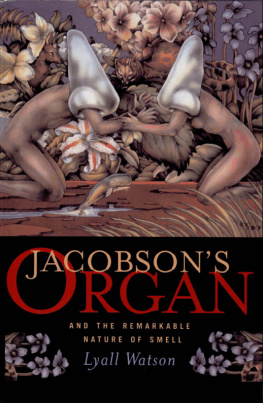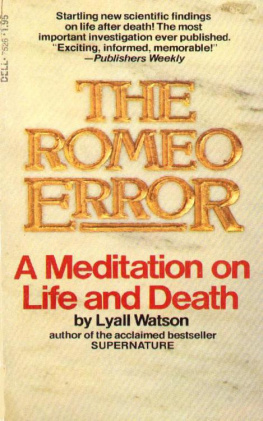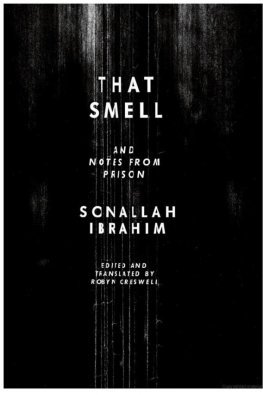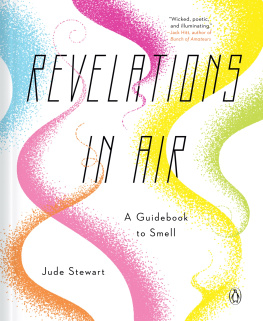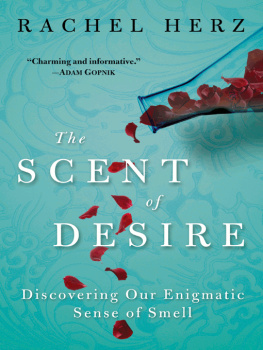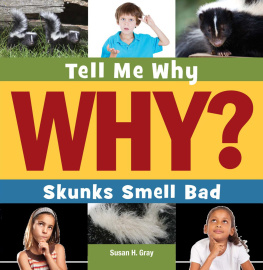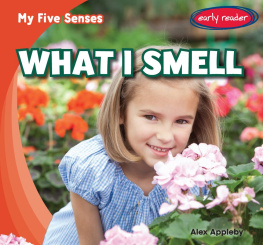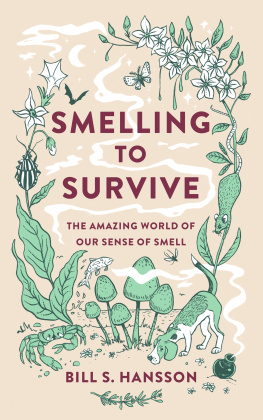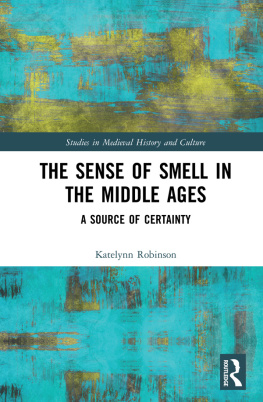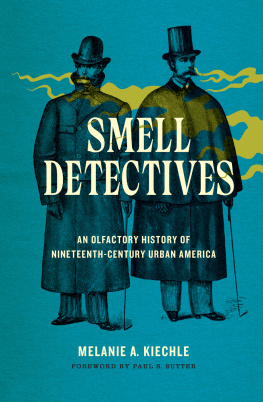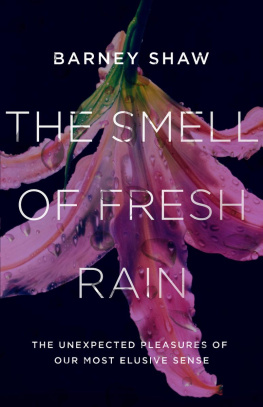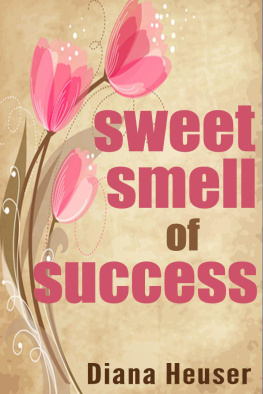LYALL WATSON
Jacobsons Organ
and the Remarkable
Nature of Smell

ALLEN LANE
THE PENGUIN PRESS
The most mysterious, the most human thing, is smell
COCO CHANEL, in Her Life, Her Scents
Contents
We have a nose for things. We sniff out problems and follow our noses, moving to a successful conclusion in directions that are often far from obvious. And yet we persist in belittling our olfactory abilities, dismissing the human nose as a blunt instrument.
It is true that most animals have a more acute sense of smell. Dogs are a million times more likely to pick up social scents, hedgehogs ten thousand times better equipped for finding food. But, even with olfactory centres that occupy just one-thousandth of our cranial capacity, we humans are remarkably good at detecting, recognizing and remembering odours.
We can identify our relatives by smell alone, or follow the menstrual cycles of our friends and lovers. We can diagnose disease, detect danger, and distinguish between good and bad food just with our noses. We know, along with Rousseau, that Smell is the sense of memory and desire. We realize, with Diderot, that smell is the most voluptuous sense. And we acknowledge the truth in Helen Kellers contention that smell, while representing the fallen angel of the senses, nevertheless remains a potent wizard that transports us across thousands of miles and all the years we have lived.95
So why the ambivalence? It seems we are missing something. I think we are, and I believe I know what it is. It is an obscure body part. One that has been there, right under our noses, all the time. Science has known about it since 1811. Biologists are familiar with it as the structure in the roof of a snakes mouth which tastes molecules collected by the reptiles flickering tongue. And a few dedicated anatomists have tracked down something similar in the nasal passages of possums, anteaters, bats, cats, rabbits, and even a white whale. But, though this body part was also discovered and described in humans a century ago, it has since mysteriously disappeared from the textbooks.
There are passing mentions of it in medical and technical journals dedicated to comparative anatomy and olfactory physiology, where it tends to be dismissed as something vestigial, an anatomical ghost that makes a transitory appearance in the human embryo, vanishing well before birth. And yet it still exists: a study in 1991 of a thousand randomly selected adult human subjects found it in the noses of almost every one.
This elusive feature is the Organ of Jacobson, named after the sharp-eyed Danish anatomist who discovered it nearly two centuries ago. It is easy to miss. The external evidence consists simply of a pair of tiny pits, one on either side of the nasal septum, a centimetre and a half above every human nostril. But the fact that it does exist changes everything. With it, we reinherit the possibility of a powerful and ancient chemical sense: an ability to enter once more into a system of subliminal signalling that continues to give other animals access to a world we thought we had lost as a result of our emphasis on sight instead of smell.
Jacobsons Organ rescues our most underrated sense from obscurity. But it is not simply a supercharger, making us more sensitive to odours. What it seems to do is to open up a channel quite separate from the main olfactory system. It feeds an older, more primal area of the brain, one that monitors airborne hormones and a host of other undercover patterns of information, making physiological changes that have profound effects on our awareness, on our emotional states and on our most basic behaviours. Recent research suggests that this system could be the mechanism necessary for operating a true sixth sense, one that may account for our sometimes apparently supernatural ability to receive information not normally available to the traditional five faculties.
If all this is true, Jacobsons Organ could be the most important key to unravelling the mysteries of our minds since the discovery of the unconscious. As an evolutionary biologist and anthropologist, that possibility excites me enormously.
Aristotle associated the four fundamental elements of earth, air, fire and water with the four basic senses of sight, hearing, touch and taste. But he also recognized a fifth element, the most essential substance of all, called quintessence and connected this to the sense of smell. That, he suggested, lay at the heart of perception, linking the other four senses. Ever since then, five has been the established number of the senses in Western culture. I have no argument with Aristotle, but I believe it is time to extend his fifth sense, already at the centre of awareness, into new areas, expanding smell in ways that give our Cinderella sense its proper due.
Lyall Watson
Castlemehigan, Ireland, November 1998
Smell is the forgotten sense. There are no agreed measures of its nature, no societies dedicated to its appreciation, no descriptions of it except those borrowed from our overbearing sense of sight.
Smell is our most seductive and provocative sense, invading every domain of our lives, providing the single most powerful link to our distant origins. But it is also mute, almost unspeakable, defying description and collection, challenging the imagination. All that stops it slipping entirely through the net of language is a few brave attempts to pin it down beginning with the work of a very tidy-minded Swede.
Carolus Linnaeus (170378) was the Great Indexer. He studied medicine at Uppsala University, but his heart was always in botany. He began his green studies with a survey of all the flowering plants of Lapland, completing this task in 1737 with the aid of a revolutionary new system of defining and describing every species. And during the next twenty years he engineered a huge expansion in natural history, publishing his Systema naturae and docketing everything in sight, changing for ever the way we think about the world around us.114
Knowing the names of things gives us power over them: the power to isolate them from nature. This separation remains artificial but also extraordinarily useful, making it possible for us to set the trees aside for a moment and concentrate instead on the composition and coexistence of the forest. Labelling is an essential first step in coming to terms with ecology, and Linnaeus, in his fever to catalogue all of existence, applied his art even to the elusive world of smells, scents and stenches. There were, he decided, seven major classes of odour, ranging from the pleasant to the unpleasant, from those he described as kindly and desirable to our nerves and even to life itself to those that were patently repellent to life.115
Linnaeus published Odores medicamentorum in 1752 and there have been dozens of attempts during the last two and a half centuries to refine this system, approaching it from the vantage points of psychology, chemistry, physiology and perfumery. Some of these refinements are convenient for cosmetic chemists and those working in the fragrance industry, but even the most sophisticated new taxonomies are unsatisfactory and inconsistent in the end. They founder on the accidental nature of most smells and on the lack of a specialized vocabulary for the act of smelling in any language.115
There is no semantic tradition, no critical study of the origin and function of words used to describe smells in any country, and no learning process in any culture assigned specifically to the sense of smell. So I find myself returning, time and smell again, to the classification provided by the man whom novelist John Fowles calls The Great Warehouse Clerk of Nature.57 And finding solace, even a surprising new depth of meaning, in the resonant succession of Fragrantes (fragrant), Hircinus (goaty), Ambrosiacos (ambrosial), Tetros (foul), Nauseosos (nauseating), Aromaticos (aromatic) and Alliaceos (garlicky).
Next page
